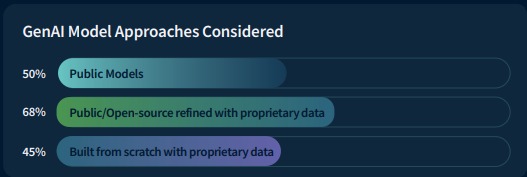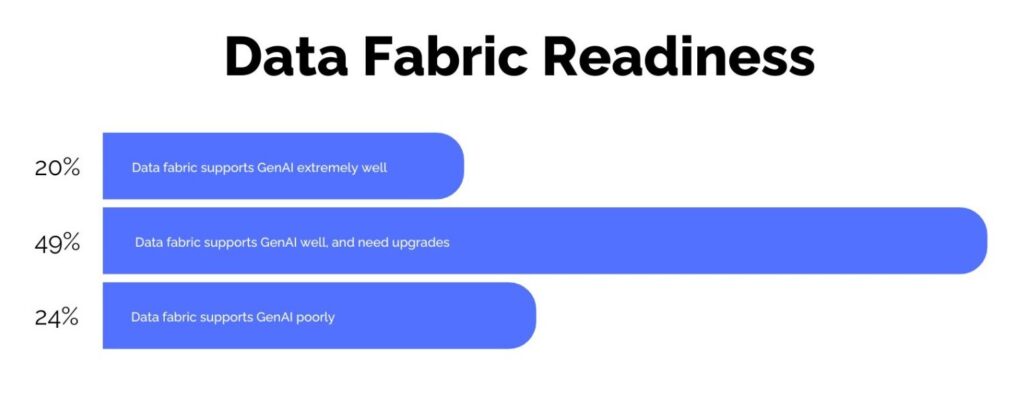
The rapid emergence of generative artificial intelligence (GenAI) has generated immense enthusiasm due to its transformative possibilities. However, at this initial phase, most organizations are only starting to understand the most effective ways to harness its power.
To gain a deeper understanding of how GenAI influences organizations, Qlik published a survey – Generative AI Benchmark Report. This report provides valuable insights into how enterprises invest in and deploy generative AI technologies.
Here are the key findings and takeaways from the report.
Hybrid Approach to AI
While GenAI has gained immense popularity, traditional AI continues to hold significant value for organizations. Traditional AI, especially in predictive analytics, continues to deliver value.
Nevertheless, GenAI possesses unique qualities that make it more suitable for specific scenarios, indicating its crucial role in the future operations of nearly every organization. For example:
- GenAI is well-suited for specific use cases related to creativity and innovation.
- It enables faster progress and substantial productivity gains for organizations.
- GenAI introduces novel problem-solving methods and provides deeper insights into data.
- Unlike traditional AI, GenAI is accessible to a broader range of users, not limited to data scientists and engineers.
- Effective implementation of GenAI often requires access to extensive datasets for optimal performance.
Hence, Enterprises are adopting a hybrid approach, integrating generative AI with traditional AI. This combination is seen as a way to effectively scale AI’s impact across organizations.
Generative AI Investment Trends
Even though the idea of generative AI has been studied for many years, it didn’t become widely popular until 2022, when products like DALL-E 2 and ChatGPT were introduced. Once these GenAI applications gained attention, organizations rushed to adopt them, even if they were unprepared.
Fast forward to the present, the landscape of AI investments reveals the following statistics: 79% of respondents have invested in generative AI tools or projects. Among them, 39% have a well-defined AI strategy in place, while 36% have both invested in GenAI and formalized their AI strategy. Additionally, 41% have invested in GenAI but haven’t yet established a concrete strategy.
This shows the varying levels of readiness and approaches among organizations in the realm of artificial intelligence.


Approaches to Generative AI
Among the organizations developing or in the process of creating an AI strategy, the majority intend to incorporate public or open-source models, often enhancing these models with their proprietary data.
According to the report, 50% of these organizations plan to utilize public models. In comparison, a significant 68% intend to leverage public or open-source models that have been further enhanced with their proprietary data. Additionally, 45% of these entities are considering developing models from the ground up, incorporating their exclusive data sets to create tailored AI solutions.
This demonstrates a different yet strategic approach to harnessing the power of AI, emphasizing the importance of combining established models with proprietary data for optimal outcomes.


As organizations delve into AI strategy development, the need for expert assistance in data training becomes increasingly apparent. Nearly 60% of these entities acknowledge the necessity of external support, relying either partially or entirely on third-party expertise for their data training processes. In contrast, 36% opt for an entirely in-house approach, while a smaller 4% fully entrust their data training endeavors to external entities.
This diversity in approaches highlights the complex decision-making in organizations, weighing the benefits of external proficiency against the advantages of an internal, self-contained strategy. The different options emphasize the important role of third-party support in shaping innovative organizations’ AI strategies.
Additionally, a substantial 86% of respondents have identified data analysis as the primary application for AI, showcasing GenAI’s potential to enhance organizational capabilities significantly. GenAI empowers individuals across various roles, not limited to technical experts, enabling them to quickly and effortlessly derive valuable insights from their data. Yet, the effectiveness of these insights heavily relies on the quality of the underlying data.
Beyond data analysis, other key use cases garnering attention include chat-bot integration, which resonates with 70% of respondents, while 50% express interest in AI-driven code writing and development, and 46% are keen on AI-powered content creation. These varied applications underscore the versatility of GenAI in catering to diverse organizational needs, promising innovative solutions in areas ranging from communication to creative content generation.


Data Foundation and Strategies
Organizations realize the importance of a trusted data foundation to support generative AI. To execute their strategies, organizations need to figure out their data effectively. A robust data fabric is essential to fuel insights and advanced use cases where generative AI and traditional AI converge. Data Fabric is Data Integration, Data Governance, Data Quality, Business Intelligence, Analytics and ML/AI/Generative AI.
Most organizations acknowledge the significance of a robust data fabric foundation for GenAI success. However, just 20% of the survey participants feel that their data fabric is extremely well-equipped to fulfill their GenAI requirements. White 49% say their data fabric supports GenAI somewhat well, but may need upgrades. Lastly, 24% say their data fabric supports GenAI somewhat poorly or very poorly.


A majority of respondents emphasized the significance of data quality (87%), ML/AI tools (76%), data governance (75%), data integration (68%), and BI/Analytics (64%). These aspects are deemed crucial or very important in establishing a data fabric that facilitates the success of generative AI.


Allocating resources to these areas will help organizations overcome common implementation challenges, including regulatory compliance, data security, and resource constraints, as mentioned by the respondents.
In light of this situation, it’s not surprising that 73% of respondents anticipate boosting their investment in technologies that support data fabrics while 18% expect a significant increase. Nearly 82% of respondents expect their data fabric spend to increase in 2024 by more than 10%.
A significant 31% of respondents are gearing up to allocate budgets exceeding $10 million specifically for data fabric investments in the upcoming year. Additionally, approximately 28% of organizations are planning to invest in the range of $10 million to $49 million.
These substantial financial commitments underscore the strategic importance organizations place on building a robust data fabric. This dedicated investment demonstrates a collective focus on fortifying data foundations, ensuring that they are not only reliable but also agile enough to accommodate the evolving landscape of generative AI and other advanced technologies.
Part of this investment will be directed towards managing data volumes, as nearly three-quarters of participants stated that generative AI is expected to increase the volume of data being handled in current analytics processes.
GenAI Budget Planning
The majority of organizations are allocating fresh funds to back their GenAI projects in the upcoming year. Sixty percent of them intend to invest more than $10 million. Merely a small fraction, less than 5% of respondents, do not have plans to allocate a budget for GenAI in the current year.


Regulatory Barriers
The few organizations abstaining from GenAI investments currently (32%) cite regulatory challenges and apprehensions regarding data security (32%) as significant hurdles they must navigate. Around 23% face lack of resources and 13% with no clear use case for business.


These concerns are universal, affecting every organization. Even those presently opting for GenAI investments must tackle these challenges to guarantee the success of their GenAI initiatives.
Data is the King
Every organization’s AI strategy could vary, but one constant factor that remains the same is optimal AI results begin with superior data. Given the extensive data that requires curation, quality assurance, security, and governance to support AI and create meaningful GenAI models, a contemporary data fabric is crucial. Once the data is properly managed, your platform should offer comprehensive AI-enabled features, ensuring that all users, regardless of their expertise, can access potent insights, automation, and support.
When selecting an AI-enabled platform to align with your AI strategy, ensure it covers the following aspects:
- AI Foundation: A robust data fabric layer that facilitates the preparation of controlled, high-quality data essential for trustworthy AI.
- Augmented AI: Comprehensive AI-powered business intelligence (BI) capabilities to keep your analytics a step ahead.
- Self-Service AI: Inbuilt Predictive AI tools that enable analytics teams to effortlessly create machine-learning (ML) models and predictive insights.
About the Report
In August 2023, Qlik conducted a study in collaboration with ETR to gain deeper insights into how GenAI is influencing organizations and their approaches to data management. They gathered feedback from 200 participants, including C-level executives, VPs, directors, and senior architects and engineers representing Global 2000 companies across various sectors.



